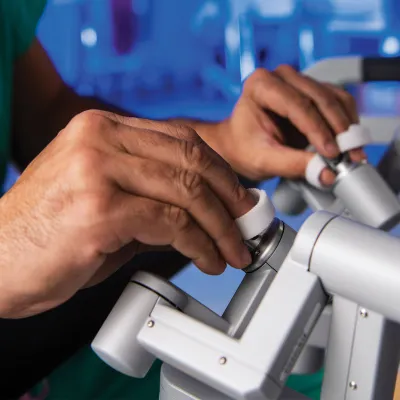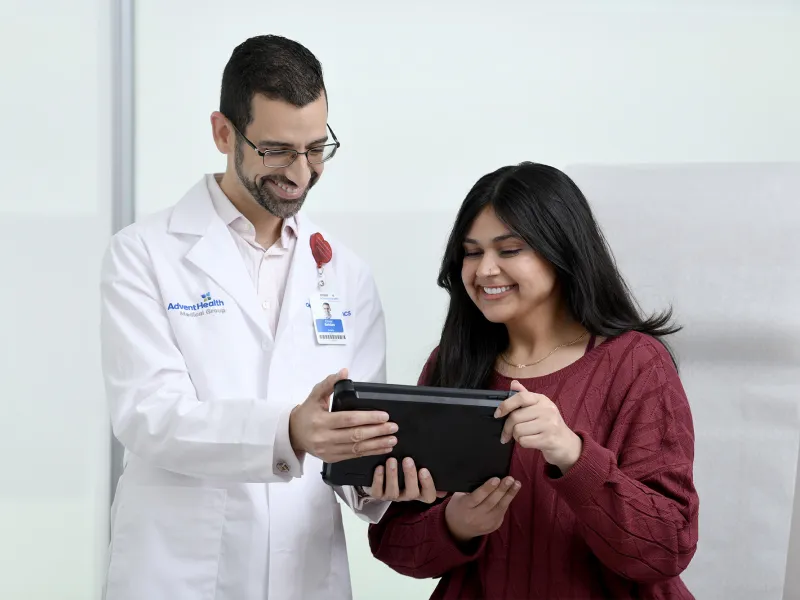
AdventHealth Digestive Institute Specializes in Robotic Pancreatic Surgery
AdventHealth Digestive Health Institute has some of the most experienced doctors in the world performing surgery for pancreatic conditions and cancer. Today, AdventHealth Digestive Health Institute performs more robotic pancreas operations than any other center in the country.
Seeing an experienced surgeon is important for patients who have a pancreatic cancer, tumor or cyst. This is because surgery often gives patients the best hope for a cure. Unfortunately, some patients are told they are not candidates for surgery when in reality a highly experienced pancreatic surgeon could take their cases. If you have been told that you could not have surgery for a pancreatic cancer, tumor or cyst, we hope you will consider seeing one of our surgeons for a second opinion.
Whole-Person Care for Pancreatectomy
A pancreatectomy is commonly used to treat these conditions:
- Pancreatic cancer
- Pancreatitis (inflamed pancreas)
- Pancreatic cysts – Some pancreatic cysts and pseudocysts, such as mucinous cyst adenoma and intraductal papillary mucinous neoplasm (IPMN), have a high chance of being or becoming cancerous.
The pancreas has a head (lower side on the right) and tail (at the left side). The surgery used to treat the pancreatic condition is determined by the condition’s location within the pancreas.
The types of pancreatectomies are:
- Pancreaticoduodenectomy, or Whipple procedure. This surgery is used to treat conditions affecting the head of the pancreas. It involves removing not only the pancreatic head, but also the gallbladder, part of the stomach, the first part of the small intestine, and some of the surrounding lymph nodes. The parts of the digestive system are then reconnected in such a way so that they can function without the head of the pancreas.
- Pylorus-preserving pancreaticoduodenectomy (PPPD). This approach keeps intact the stomach and the pylorus, the valve where the stomach empties into the small intestine. There may be pros and cons to this pylorus-preserving approach. An experienced surgeon weighs all of the factors in a particular patient’s case and knows whether to recommend a Whipple procedure or a PPPD.
- Distal pancreatectomy. This surgery is used to treat conditions affecting the tail or left side of the pancreas. It involves removing the left side of the pancreas. Distal pancreatectomy is usually performed along with a splenectomy, or removal of the spleen. This is done because at its tail, the pancreas shares blood vessels with the spleen. Unlike the Whipple procedure, distal pancreatectomy does not remove the gallbladder and portions of the stomach and small intestine.
- Total pancreatectomy. This procedure is similar to the Whipple procedure, but it involves removing the entire pancreas as well as the spleen. It is rarely used and only when pancreatic tumors affect both the head and tail of the pancreas.
The AdventHealth Digestive Institute extensive pancreatic surgery experience allows us to offer pancreatectomy as a minimally invasive surgery in many cases. The ability of patients to have minimally invasive procedures depends on their medical status and body mass index, where their tumors are, how close they are to key blood vessels and the biological nature of the tumors.
The two main minimally invasive approaches to pancreatectomy include:
- Laparo-Endoscopic Single Site (LESS) “Scarless” Pancreatectomy. Using very small surgical instruments, the surgeon operates through a single incision made in the patient’s belly button. In addition to less pain and a faster recovery, the surgical scar will be hidden in the belly button, making it appear as if the patient did not have surgery.
- Robotic Pancreatectomy. Dr. Ross is accomplished in performing operations assisted by the da Vinci® Surgical System. We rank as the nation's top center in volume of robotic pancreatectomies. This approach to pancreatectomy can give some patients with particularly complex cases the option of having minimally invasive surgery. Without the surgical robot, these patients would otherwise need an open procedure.
Pancreatectomy is a major surgery. Many patients experience temporary side effects after surgery that take some time to go away. However, having a minimally invasive surgery is much easier on patients than an open surgery with a large incision would be. A shorter recovery is especially important for cancer patients because it allows them to begin their next phase of treatment sooner.
Pancreatic, Biliary and Gallbladder Disease
-
Pancreatic Cancer
Our surgeons are among the region’s most experienced in pancreatic surgery. We can help treat your cancer with minimally invasive options. Learn more today.
-
Pancreatic Conditions
Gastroenterologists and surgeons at AdventHealth Digestive Health Institute are experts for treating Pancreatitis, Pancreatic Cyst and other conditions of the pancreas.
-
Pancreatic Surgery
AdventHealth Digestive Health Institute's pancreas surgeons offer minimally invasive pancreatectomy for Pancreatitis, Pancreatic Cysts and Pancreatic Cancer. Learn more.
-
Gallbladder Cancer
Removing the gallbladder with cancer is a very complex surgery that requires highly experienced surgeons like those at AdventHealth Digestive Health Institute.
-
Gallbladder Conditions
Advanced surgeons at AdventHealth Digestive Health Institute provide cholecystectomy and other treatments for gallbladder pain and gallstones.
-
Gallbladder Surgery
Surgeons at the AdventHealth Digestive Health Institute provide advanced, scar-less cholecystectomy for gallbladder pain and gallstones.
-
Bile Duct Diseases and Conditions
AdventHealth Digestive Health Institute gastroenterologists and gastrointestinal surgeons treat bile duct obstruction (blocked bile duct) and cholangiocarcinoma (bile duct cancer).
-
Endoscopy for Pancreatic, Bile Duct and Gallbladder Conditions
Gastroenterologists at AdventHealth Digestive Health Institute use ERCP and endoscopic ultrasound to diagnose and treat pancreas, gallbladder and bile duct diseases.

Recover Faster With Minimally Invasive and Robotic Surgery
The expert surgeons at the AdventHealth Digestive Health Institute have a large depth of experience in offering minimally invasive surgery.

Meet Your Dedicated Experts
Our specialists are passionate about providing collaborative care that addresses your unique needs and goals while ensuring you feel informed and supported every step of the way. Learn more about our team and their areas of expertise.

Surgical Consultations For Digestive Cancer Without the Wait
Appointments Within Seven Days for Patients with Cancer
At AdventHealth Digestive Health Institute, we know that after being diagnosed with cancer, patients want and often need to begin treatment quickly. So we make it a priority to offer appointments for cancer surgery consultations within five business days, and often earlier.
Patients who are newly diagnosed with cancer, or have just found out they have cancer again, qualify for this priority access. Our surgeons will make themselves available to see you right away, even for a second opinion. We want to help you start your treatment as soon as possible.
Let Us Help You Feel Whole Again
Whether you’re experiencing new symptoms or want a second opinion on a diagnosis, our dedicated digestive health experts are here to help you find answers and a path forward. Request an appointment today to take charge of your health and get the personal support you need.
